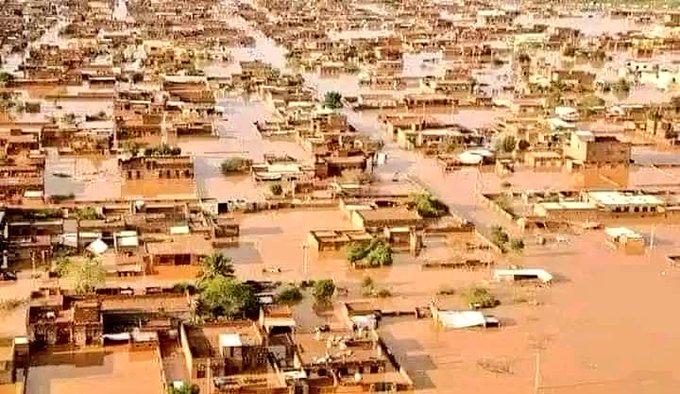COP27: ‘Agroecology most efficient way to adapt to climate change’ in Africa
“Sustainable, locally driven agriculture solutions to address the climate crisis” are being called for by the Alliance for Food Sovereignty in Africa (AFSA) as day two of the COP27 climate summit kicked off in Egypt.
 Entire villages were flooded in El Managil in El Gezira in Sudan during the rainy season this year (social media)
Entire villages were flooded in El Managil in El Gezira in Sudan during the rainy season this year (social media)
“Sustainable, locally driven agriculture solutions to address the climate crisis” are being called for by the Alliance for Food Sovereignty in Africa (AFSA) as day two of the COP27 climate summit kicks off in Egypt.
This morning, UN Secretary General António Guterres warned: “We are on a highway to climate hell with our foot still on the accelerator.” He told delegates that the world is fast approaching tipping points that will make climate chaos “irreversible.”
AFSA, Africa’s largest civil society organisation representing more than 200 million farmers, pastoralists, fisherfolk, indigenous peoples, women’s and youth movements, and faith groups across the continent, suggested “integrating agroecology into regional and national climate policy spaces” in a press release this morning.
Farming under threat
According to the Global Alliance for the Future of Food, resilience is key as increased droughts, heatwaves and storms already hitting food production and yields, and risking mass crop failures.
Farmers in Sudan are under increased pressure as pests, low sale value of crops, and a lack of workers is pushing impoverished farmers to find other sources of income, said the director of the Ministry of Production and Economic Resources of South Kordofan, Ibrahim Omar Hamouda, in an interview with Radio Dabanga last week.
In addition, Sudan is struggling to manage its water resources amidst political turmoil and an economic slump. The lack of a functional irrigation system means that the country struggles to profit from the rainy season. Instead, floods threaten farmland and little water is retained to survive the dry season.
Last year, farmers were forced to take loans from the country’s Agricultural Bank to prepare for the winter season, as the bank's financing of production inputs stopped five years ago, and they did not receive any other state support in the meantime.
“Small-scale farmers are doing everything they can to adapt, but they need support and climate finance." Yet just 3 per cent of public climate finance goes to food systems, and even less to small-scale producers, according to the Global Alliance for the Future of Food.
Sudan in crisis
Sudan is struggling under “a weak state unable to meet its people’s basic needs, warlord rule in many regions, and populations facing hunger or famine as COVID and the Russia-Ukraine war multiply economic burdens” according to the United States Institute of Peace (USIP).
As Sudan’s complex crisis deepens, reflecting that of many other fragile states around the world, climate change will only extend dry periods and worsen destructive floods caused by short heavy rains. Sudan is near the bottom of Notre Dame University's GAIN rankings, which measure resilience to climate change.
Nonetheless, a USIP article published last month said: “An asset that can help Sudan build the more responsive governance it needs is the country’s remarkably vibrant, deeply rooted tradition of nonviolent civic action.”
Agroecology movement
The term ‘agroecology’ goes beyond a set of practices to mitigate the damage done by industrial farming, instead characterised as “a social movement for producers’ empowerment and a multidisciplinary scientific paradigm” by the UN Food and Agriculture Organisation (FAO).
Scientific evidence demonstrates that agroecology increases climate resilience, according to a study by FAO published in 2020. “Success factors for this are that agroecology builds on ecological principles, in particular on biodiversity, overall diversity and healthy soils, along with social aspects, in particular on the co-creation and sharing of knowledge and fostering traditions.”
Million Belay, AFSA General Coordinator and Panel Expert with IPES-Food, said today that it could be possible for the continent of Africa to feed itself. “Agroecology cannot and must not be overlooked by decision-makers as the most effective means to build resilience and enable small-scale farmers, pastoralists, and fishers to adapt to climate change,” he said.
Before COP27 began, AFSA submitted a position paper to outline a path forward for leaders and policymakers to prioritise climate adaptation through agroecology. In the paper, AFSA outlines five key demands, including making agroecology part of COP27 climate decisions, engaging small-scale food producers in climate adaptation, focusing on protection of land from degradation due to large-scale agriculture and (re)establishing local management, directing finance to small-scale food producers, and operationalising the UNFCCC’s Gender Action Plan.
Food systems are in the unique position to either significantly exacerbate, or significantly reduce, the ongoing climate crisis. However, “COP27’s major agricultural initiatives are expected to either tinker at the edges of the existing system, or expand industrial agriculture by supporting patents and techno-fixes, while side lining agroecology,” according to a press statement by A Growing Culture and the International Panel of Experts on Sustainable Food Systems last week.











 and then
and then